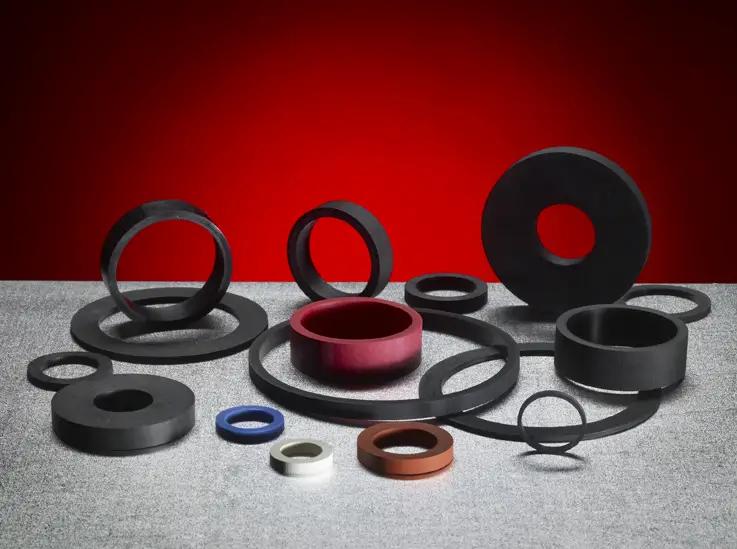Rubber Gaskets: The Unsung Heroes of Sealing Technology

In the world of engineering and industrial applications, there is a vital yet often overlooked component that plays a crucial role in ensuring the efficiency and safety of various systems – the rubber gasket.
These unassuming circular seals are the unsung heroes of sealing technology, serving as the barrier that prevents leaks, minimizes vibrations, and protects against external elements. Rubber gaskets have found their way into a wide array of industries and applications, proving their indispensability time and time again.
Understanding Rubber Gaskets
Rubber gaskets are mechanical seals made from various types of rubber or elastomer materials. These gaskets are designed to fit between two or more mating surfaces, creating a tight and secure seal.
The main function of a rubber gasket is to prevent the leakage of gases, liquids, and other substances, while also providing a cushion to absorb vibrations and impacts.
Types of Rubber Gaskets
There is a diverse range of rubber gaskets available, each suited to specific applications based on the requirements of the environment they will be used in. Some common types of rubber gaskets include:
Nitrile Rubber Gaskets: Nitrile rubber gaskets are highly resistant to oil, fuel, and other petroleum-based fluids. They find extensive use in automotive applications, as well as in oil and gas industries.
Neoprene Rubber Gaskets: Neoprene gaskets are known for their excellent resistance to weathering, ozone, and chemicals. They are often used in outdoor applications, electrical enclosures, and as weather seals.
EPDM Rubber Gaskets: EPDM (Ethylene Propylene Diene Monomer) gaskets are widely used in applications requiring excellent resistance to weather, heat, and steam. They are commonly found in HVAC systems and automotive cooling systems.
Silicone Rubber Gaskets: Silicone gaskets are known for their high-temperature resistance and flexibility. They are used in applications like food processing, medical devices, and aerospace.
Viton® Rubber Gaskets: Viton® gaskets are known for their outstanding resistance to chemicals and extreme temperatures. They are commonly used in industrial settings where exposure to aggressive fluids is a concern.
Natural Rubber Gaskets: Natural rubber gaskets offer good resilience and elasticity and are used in a variety of general-purpose applications.
Applications of Rubber Gaskets
Rubber gaskets find widespread use in numerous industries and applications, including:
Automotive Industry: Rubber gaskets are extensively used in engines, transmissions, and other critical automotive components to prevent fluid leaks and maintain performance and reliability.
Piping Systems: In plumbing and industrial piping, rubber gaskets ensure leak-free connections, particularly in environments where the sealing surfaces may not be perfectly smooth.
Electronics and Electrical Equipment: Rubber gaskets act as environmental seals in electrical enclosures, protecting sensitive electronics from dust, water, and other contaminants.
Food and Beverage Industry: Silicone rubber gaskets are commonly used in food-grade applications due to their non-toxic and heat-resistant properties.
Aerospace and Aviation: Rubber gaskets are employed in aircraft engines, fuel systems, and hydraulic systems, where their reliability is critical for safe operations.
Medical Devices: Silicone rubber gaskets are utilized in medical equipment, providing a sterile and safe sealing solution.
Importance of Proper Gasket Selection and Installation
Selecting the right type of rubber gasket and ensuring proper installation are crucial for achieving optimal performance and preventing potential failures. Factors such as the operating environment, temperature, pressure, and exposure to chemicals should be carefully considered during gasket selection.
Additionally, proper installation techniques, such as tightening bolts evenly and adhering to recommended torque values, are essential to prevent over-compression or under-compression of the gasket.
Though often unseen, rubber gaskets are indispensable components that play a significant role in various industrial applications. From preventing leaks and ensuring safety to providing cushioning and environmental protection, these small yet mighty seals continue to be an essential part of modern engineering and technology.
Engineers, manufacturers, and end-users alike should recognize the importance of proper gasket selection, installation, and maintenance to maximize the performance and longevity of the systems in which these unsung heroes are employed
